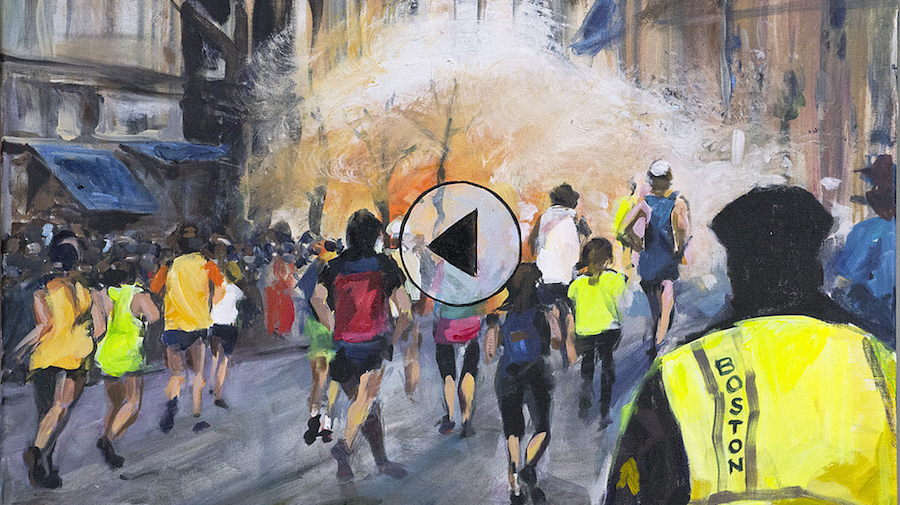In the wake of the Boston Marathon bombing I reviewed nearly 100 articles on media coverage of the bombing and ensuing manhunt. What follows is a round-up of some of the best articles specifically related to verification of eyewitness media and misinformation on social networks.
The post is organized thematically: guidelines and how-tos, analysis of what went wrong, debates about possible fixes, big picture discussions.
I don’t agree with all of the viewpoints expressed in these articles, but together they present a well-rounded look at what we can learn from what went right and wrong during the coverage of this week-long breaking news event.
*A version of this post originally appeared at my personal blog.
Part 1: Guidelines and ‘how-to’ posts

Amidst the chaos in the aftermath of the bombing a few editors, journalists and citizens outlined their best practices and guidelines for responsible reporting and careful verification. There is a lot of good advice contained in these posts.
Thou Shalt Not Stoop to Political Point-Scoring: A journalist’s guide to tweeting during a crisis
by Jeremy Stahl, Slate
“Twitter has only made the business of news gathering and sharing in the wake of a disaster more treacherous. If, as a wise journalist once said, journalism is the first rough draft of history, then Twitter is the first rough draft of journalism. During nightmarish events like today’s bombings at the Boston Marathon, the micro-blogging service is both the cause of and solution to a whole lot of journalistic problems.”
How the AP verified photo of Boston bombing suspect leaving scene
by Andrew Beaujon, Poynter
“The AP asked Green, a Florida businessman who’d completed the marathon and was watching other runners finish when the bombs went off, for a high-resolution version of his pic. The time stamp and the resolution convinced the photo department it was real.”
When conspiracy theories strike, how do you respond?
by Damon Kiesow, Kiesow.net
“You certainly can not ‘win’ in these situations. There is no gatekeeper available to make a ruling on truth vs fiction. Some people will continue to believe whatever they want to believe. But, we can’t pretend that the spread of misinformation is not worth fighting.”
When Following Breaking News, Why it Helps to Think Like a Journalist
by Jihii Jolly, PBS MediaShift
“Breaking news creates an information fog. Mistakes are made as rumors are spread. […] So what can we take away from events like today in Boston? We can think about how we read about it. And in the era of everyone having a voice and a blog and the power to create content, it might help to think a little bit like a journalist.”
We know when Dzhokhar Tsarnaev sleeps
by Zachary M. Seward, Leo Mirani, and Ritchie King
“Where it was once only reporters and the police who dug up information about people of interest, a whole nation is at it today. And for all the myriad concerns about privacy settings, cookies, data protection, automated surveillance, and Facebook, we reveal immense amounts of information about ourselves publicly, unthinkingly, and sometimes involuntarily.”
Boston bombings rumors: Separating fact from fiction
by Ken Millstone of MSN News
“Since the tragedy on Monday, rumors and misinformation have been rampant. These are just some of the rumors that have emerged, with MSN News reporting on the validity of each.”
Separating Social Media’s Fact From Fiction Amid Crisis
by Celeste Headlee and Jeremy Stahl, NPR
“In the moments following the twin explosions at the Boston Marathon, many of the initial reports disseminated through social media proved to be false. Jeremy Stahl, social media editor for Slate.com, shares his rules for social media responsibly in the midst of tragic, breaking news.”
Part 2: What went wrong

The following articles are the journalistic equivalent of an autopsy report. They try to get a handle on, and often try to place blame, for the misinformation that spread during Boston reporting. At their best, these posts actually help clarify mistakes that were made, so we can learn from them. At their worst they devolve to name calling.
It Wasn’t Sunil Tripathi: The Anatomy of a Misinformation Disaster
by Alexis Madrigal, The Atlantic
“How a terrible misidentification of two people with no connection to the Boston bombing spread so far, so fast.”
Boston bombing: How internet detectives got it very wrong
by Dave Lee, BBC News
“The only hope, he said, was that this very public and damaging mis-identification serves as a lesson to those eager to be ‘first’ with new information online. ‘It’s been a kind of a media literacy seminar — people are learning to be less stupid. You don’t want to be the person who names a suspect who turns out not to be right.’”
Four ways the media failed in covering the Boston bombings, and one reason why
by Gideon Lichfield, Quartz
“It’s been a tiring week for anyone in the media — and a sobering one for anyone in the media with a conscience. The coverage of the Boston Marathon saga, from the bombing on Monday to the capture of suspected bomber Dzhokhar Tsarnaev on Friday, brought out some of the very worst features of news in the digital age. Here are the ways the media fail when they cover a big, breaking story — and a simple reason why.”
The problem with cable news: Cable news
by Erik Wemple, Washington Post
“The very idea of covering news every second of the day till the end of the world forces its practitioners to find and tout breaking news all the time, even when it’s not breaking. And long after it’s breaking. The result is occasionally pure glory, occasionally error and always a surfeit of blabbing. Never has cable news’s content problem been more apparent than it was last week, especially Friday.”
Breaking News Is Broken
by Farhad Manjoo, Slate
“Breaking news is broken. That’s the clearest lesson you can draw about the media from the last week, when both old- and new-media outlets fell down on the job.”
Citizen ‘journalism’ ran amok in Boston crisis
by Alan Mutter, Reflections of a Newsosaur
“When untrained, undisciplined or even unscrupulous people can say anything that comes to mind — as happened repeatedly during the Boston emergency — they do far more harm than good, especially in the sort of confusing and emotional situation we witnessed last week. While citizen journalists in some cases bring welcome light to matters than need attention, the overwhelming bias in certain online venues seems to be to bring additional heat to matters that are already hot enough.”
How Reddit became a national scapegoat
by Jesse Brown, Macleans
“‘Reddit’ didn’t do anything. The site is an open, anonymous forum where anyone can say anything. It’s comprised of millions of people, using pseudonyms to link to stories, make comments, share content and rank each other’s input. […]For our purposes, in making sense of what happened last week, Reddit doesn’t really exist. It’s not an organization or individual of any kind. It’s as useless a noun as ‘the Internet,’ or ‘humanity.’”
The Pressure to Be the TV News Leader Tarnishes a Big Brand
by David Carr, The New York Times
“The pressure to produce is ratcheted up accordingly. Editors and producers begin leaning on their reporters, and they, in turn, end up in the business of wish fulfillment, working hard to satisfy their audience, and meeting the expectations of their bosses. It creates a system in which bad reporting can thrive and dominoes can quickly fall the wrong way.”
Three things that Reddit did right during the Boston bombings and why that matters
by Mathew Ingram
“While much of the attention during and after the Boston bombings focused on how one Reddit thread got things wrong, there were other important parts of the community that were doing good — and even doing something approaching journalism.”
Shameless paper in mindless fog
by Jack Shafer, Reuters
“Curiously, the Post’s extreme, almost defiant inaccuracy has united America’s armchair media critics like little else. It can hardly be denied that the racy Post has pointed the way for decades toward an info-entertainment hybrid that many have followed. This week, at least, in its stunning contempt for fact, it has defined the basement into which no media outlet that wants respect wishes to descend.”
The Boston Manhunt and the Limited Wisdom of Crowd-Sourcing
by New York Magazine
“We need to get smarter about the vectors of time and information flow. We know what the hurry is, of course. It is devoutly felt at CNN and Fox News that prestige or viewership or both depend on being the first, even if only by seconds, to announce practically anything. […] It starts to feel as though we’re Pavlov’s dogs — subjects in a vast experiment in operant conditioning. The craving for information leads to behaviors that are alternately rewarded and punished.”
Boston bombings: Social media spirals out of control
by Ken Bensinger and Andrea Chang, Los Angeles Times
“Monday’s bombings, the first major terrorist attack on American soil in the age of smartphones, Twitter and Facebook, provided an opportunity for everyone to get involved. Within seconds of the first explosion, the Internet was alive with the collective ideas and reactions of the masses. But this watershed moment for social media quickly spiralled out of control.”
Part 3: Debating fixes

These posts don’t offer the kind of concrete advice or training the earlier ‘how-to’ articles do, but they do contribute helpfully to the debate about how we should address misinformation and verification. They represent an interesting set of ideas and considerations for new ways news organizations and citizen journalists can approach breaking news.
The One Function Twitter Desperately Needs
By Mat Honan, Wired
“Twitter shouldn’t have to make sure everything crossing its servers is factual or true, but it is in Twitter’s interest to themselves to give us the tools to clean things up. Otherwise it risks becoming a cesspool of untruths and rumors. Twitter needs a way to reel bad information back in. It needs a way to let us flag things that we’ve said that turn out to be wrong. Twitter needs an edit button, a correction process.”
Twitter, Credibility and The Watertown Manhunt
by Hong Qu, Nieman Reports
“Finding and vetting reliable sources is the ghost that haunts investigative journalism past, present and future. Tools and processes for assessing source credibility need to catch up with ever evolving social media technology and culture, especially in dangerous environments in which the public relies on reporters to provide actionable news updates with minimal misinformation and fallout.”
And now the news: Here’s what we *don’t* know at this hour…
by Jeff Jarvis
“We’ve been told over and over this weekend that we had a big problem with misinformation after the Boston Marathon bombing. Breaking news, haven’t you heard, is broken. So I see an opportunity, a big journalistic opportunity. If I ran a news organization, I would start a regular feature called, ‘Here’s what you should know about what you’re hearing elsewhere’. […] The What We *Don’t* Know News, the only news show you can really trust. It doesn’t ignore breaking news or what you’re hearing. It adds value to that flow of both information and misinformation.”
Can Social Media Help Us Create A More Informed Public?
by Andy Carvin, Keynote at the International Symposium of Online Journalism
“When a big story breaks, we shouldn’t just be using social media to send out the latest headlines or ask people for their feedback after the fact. We shouldn’t even stop at asking for their help when trying to cover a big story. We should be more transparent about what we know and don’t know. We should actively address rumors being circulated online. Rather than pretending they’re not circulating, or that they’re not our concern, we should tackle them head-on, challenging the public to question them, scrutinize them, understand where they might have come from, and why.”
When Everyone is an Eye-Witness, What is a Journalist?
by Mark Little, Storyful
So many media failures this past week were driven by the ‘scoop’ mentality, a dangerous relic of the past. […] The greatest threat to ‘True Journalism’ is not social media but an outmoded concept of breaking news. The anonymous Twitter user rushing to name a suspect or the TV reporter breathlessly quoting unnamed sources are cut from the same cloth. This is ‘Me First’ journalism, powered by vanity and self-importance, and it is the greatest threat to ‘True Journalism’.
The Wise Way to Crowdsource a Manhunt
by James Surowiecki, The New Yorker
“If Reddit were looking for a model to follow, it could use NASA’s Clickworkers experiment, which in 2000–01 let tens of thousands of amateurs look at photos of Mars in order to identify craters on the planet and classify them by age. That study found that the aggregated judgments of the amateur ‘clickworkers’ were ‘virtually indistinguishable from the inputs of a geologist with years of experience.’”
Why We Should Judge Breaking News Like Baseball
by John Dickerson, Slate
“There’s been a lot of discussion about where traditional media and new media failed in their coverage of the Boston Marathon bombing. Good. We should call out the bad ones so that standards will be higher and celebrate the good so we’ll all know where to tune in next time. But as we figure out who to listen to in the future, we should also think about a way to process these breaking news developments.”
In defense of journalistic error
by Jack Shafer, Reuters
“Screwing up has been integral to the reporting of timely news for a long time , no matter how sterling a news organization’s standards […] Error tallies, such as the one above, don’t demonstrate that news reporting is a particularly error-prone enterprise but that the business and its customers have come to an unspoken agreement of how perfect the news product must be.”
Part 4: Big picture discussions and debates

These articles provide a broad overview of themes from the Boston bombing coverage. They take a step back and look at the bigger issues surrounding how journalists are engaging on social media during breaking news and the new roles that communities and news organizations play. Many include useful comparisons between coverage of Sandy Hook and Boston.
Covering the Coverage (Infographic)
by Chartgirl
Highs and lows in a week’s worth of breaking (broken?) new coverage of the Boston Marathon attack.
Breaking news pragmatically: Some reflections on silence and timing in networked journalism
by Mike Ananny, NiemanLab
“Last week’s coverage of the events in Boston showed how much the networked press needs to better understand two things: silence and timing. The Internet makes it possible for people other than traditional journalists to express themselves, quickly, to potentially large audiences. But the ideal press should be about more than this. It should be about demonstrating robust answers to two inseparable questions: Why do you need to know something now? And why do you need to say something now? Both questions demand awareness of what not to say, and when not to say it — knowledge the networked press is only beginning to develop.”
Wrong narratives may outweigh wrong facts, but reporting with respect means getting both right
by Caroline O’Donovan, NiemanLab
“Tragedies like the school shooting at Sandy Hook and the bombings in Boston are an opportunity for local news organizations, however stretched and strapped, to recommit to those communities. The power of a journalist’s training isn’t in the medium, but in the respect and diligence in the reporting they do.”
News Media and Social Media Become Part of a Real-Time Manhunt Drama
by Brian Stelter, New York Times
“The close interaction of reporters with the unfolding events underscored the complex relationship the news media have had with law enforcement authorities this week. News organizations have been both scolded for irresponsible reporting and employed to relay information to the public, sometimes at the same news conference.”
Lesson from the manhunt: We’re all journalists now
by Monica Guzman, The Seattle Times
“News became a little less of an industry and a little more of a living, breathing organism Thursday night. It’s not a new direction. For more than a decade now, ever since anyone with a thought and an Internet connection could so easily provoke his species, news has become less controlled. More vulnerable. More, well, human. It has not, though, become easy. In fact, news demands more from us now than ever.”
Boston: just another day in the news revolution?
by Charlie Beckett
“This means that journalists (and that includes those people on Reddit) have to develop a new language of what we know and don’t know that makes Donald Rumsfeld’s famous ontological aphorism look positively simplistic. They have to explain to a public who have access (potentially) to everything why their version of events is partial. There’s no shame in being open in a transparent world.”
Reddit + Boston: Journalism gets better when more people are doing it
by Mathew Ingram
“While both Twitter and Reddit have come under fire for distributing incorrect information about the Boston bombings, mainstream outlets have done so as well. In a real-time news environment, having more sources is ultimately better.”
Boston Marathon Bombing Media Errors Pile Up, as Does the Outrage
by Michael Moynihan, The Daily Beast
“The reporting errors out of Boston after the marathon blasts are piling up — and so is the finger-wagging on Twitter. But isn’t the outrage here a bit selective and dishonest?”
The Media Doesn’t Own The Story Anymore
by John Herman and Ben Smith, BuzzFeed
“With a 17-year-old implicated for the Boston bombings and then exonerated by the internet in mere hours, it’s time for the press to start guiding readers through the sea of information — and stop pretending there’s only one narrative.”
The social media tail mustn’t wag the MSM dog
by Felix Salmon, Reuters
“There’s an art to working out where to find fast and reliable information, and to judging new information in light of old information, and to judging old information in light of new information. And there’s an art to synthesizing everything you know, from hundreds of different sources, into a single coherent narrative. It’s not easy, it’s not a skill that most people have, and it’s precisely where news organizations add value.”







